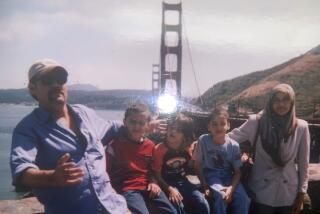Hostages’ Kin Tell Fears to U.S. Officials
- Share via
Her last name, by marriage, is Davis. A native of Kuwait, she was working in a computer firm there when she met the American co-worker who would be her husband. After the Iraqi tanks rolled in Aug. 2, she was able to get out with their two young sons. Her husband remains in hiding.
“My husband has not seen the sun in four months,” said Davis, who asked that her first name remain confidential. If he is discovered, he would likely become one of Iraqi President Saddam Hussein’s “human shields,” she said. And the Arab friends who are hiding him could face execution.
Davis was among about 35 persons who gathered at a Westwood hotel Wednesday for a private briefing on the Persian Gulf crisis by State Department officials. All have loved ones stranded in Iraq or Kuwait and are wondering when and how their shared trauma might end.
Elizabeth Tamposi, assistant secretary of state for consular affairs, said the briefing was established to help officials understand “the unique personal burdens” experienced by families. When possible, officials said, they will offer assistance.
State Department spokesman Michael Brennan emphasized that the meetings “give families a chance to meet each other, to network each other.” About 1,000 Americans are believed to remain in Iraq and Kuwait, Brennan said.
The primary value “was for emotional support. I think by the time these people crossed the nation, there was not any secret information left to pass on,” said Jan Chandler of La Canada Flintridge, whose brother Kevin Bazner is a “human shield” somewhere in Iraq.
Such disparate developments as the proposed Jan. 15 U.N. deadline for Iraqi withdrawal from Kuwait and reports that former heavyweight champion Muhammad Ali would be allowed to bring out 14 hostages have left many relatives confused.
“Things are happening so fast, and we’re getting all these mixed messages, it’s hard to sort out,” Chandler said.
The Los Angeles meeting was the eighth in a series of nine such briefings nationwide organized by State Department’s office of consular affairs.
Participants said Wednesday’s meeting was largely devoid of the expressions of anger that marked some earlier briefings, which were held in Washington, Boston, Chicago, Orlando and Houston.
“People seemed to want to do what they could do to make things better,” Chandler said.
More to Read
Sign up for Essential California
The most important California stories and recommendations in your inbox every morning.
You may occasionally receive promotional content from the Los Angeles Times.










